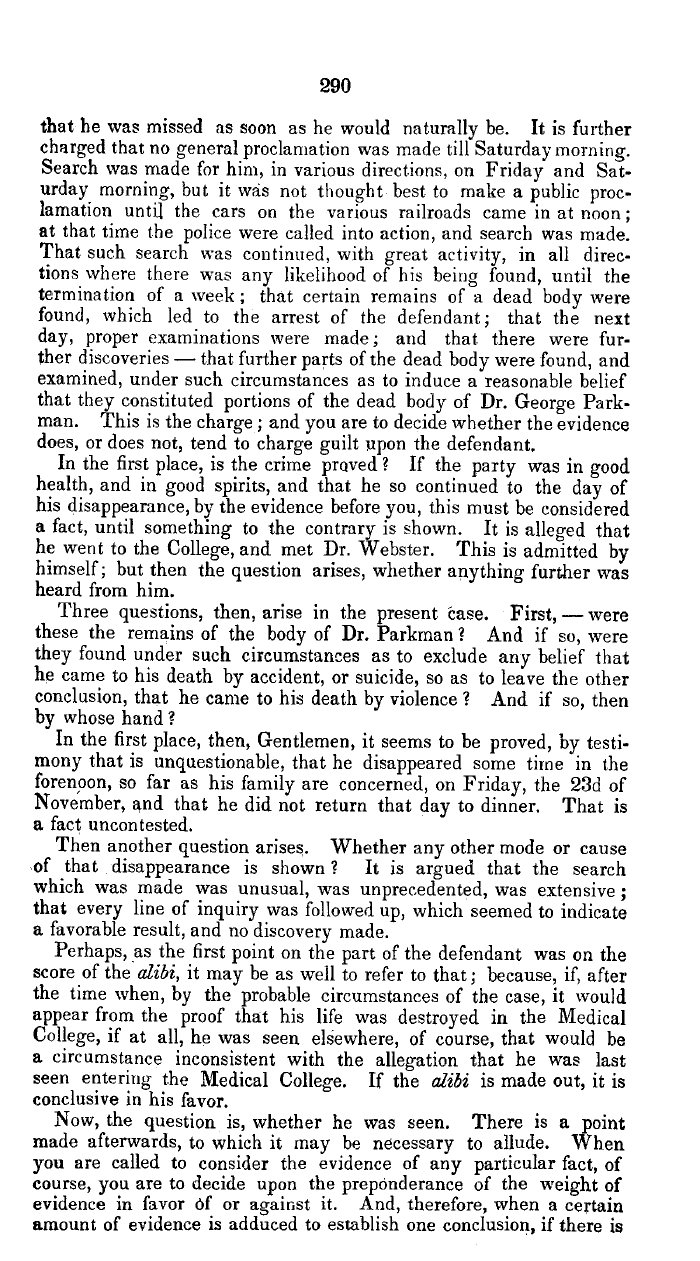|
290
that he was missed as soon as he would naturally be. It is further
charged that no general proclamation was made till Saturday morning.
Search was made for him, in various directions, on Friday and Sat-
urday morning, but it was not thought best to make a public proc-
lamation untij the cars on the various railroads came in at noon;
at that time the police were called into action, and search was made.
That such search was continued, with great activity, in all direc-
tions where there was any likelihood of his being found, until the
termination of a week ; that certain remains of a dead body were
found, which led to the arrest of the defendant; that the next
day, proper examinations were made; and that. there were fur-
ther discoveries - that. further parts of the dead body were found, and
examined, under such circumstances as to induce a reasonable belief
that they constituted portions of the dead body of Dr. George Park-
man. This is the charge; and you are to decide whether the evidence
does, or does not, tend to charge guilt upon the defendant.
In the first place, is the crime proved ? If the party was in good
health, and in good spirits, and that he so continued to the day of
his disappearance, by the evidence before you, this must be considered
a fact, until something to the contrary is shown. It is alleged that
he went to the College, and met Dr. Webster. This is admitted by
himself; but then the question arises, whether anything further was
heard from him.
Three questions, then, arise in the present case. First, - were
these the remains of the body of Dr. Parkman ? And if so, were
they found under such circumstances as to exclude any belief that
he came to his death by accident, or suicide, so as to leave the other
conclusion, that he came to his death by violence ? And if so, then
by whose hand
In the first place, then, Gentlemen, it seems to be proved, by testi-
mony that is unquestionable, that he disappeared some tune in the
forenoon, so far as his family are concerned, on Friday, the 23d of
November, end that he did not return that day to dinner. That is
a fact uncontested.
Then another question arises,. Whether any other mode or cause
of that disappearance is shown ? It is argued that the search
which was made was unusual, was unprecedented, was extensive ;
that every line of inquiry was followed up, which seemed to indicate
a favorable result, and no discovery made.
Perhaps, as the first point on the part of the defendant was on the
score of the alibi, it may be as well to refer to that; because, if, after
the time when, by the probable circumstances of the case, it would
appear from the proof that his life was destroyed in the Medical
College, if at all, he was seen elsewhere, of course, that would be
a circumstance inconsistent with the allegation that he was last
seen entering the Medical College. If the alibi is made out, it is
conclusive in his favor.
Now, the question is, whether he was seen. There is a point
made afterwards, to which it may be necessary to allude. When
you are called to consider the evidence of any particular fact, of
course, you are to decide upon the preponderance of the weight of
evidence in favor bf or against it. And, therefore, when a certain
amount of evidence is adduced to establish one conclusion, if there is
|

